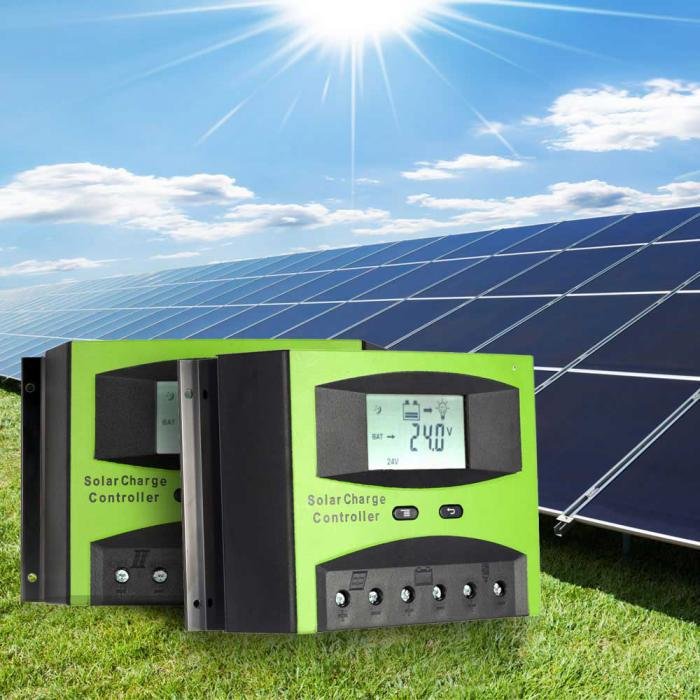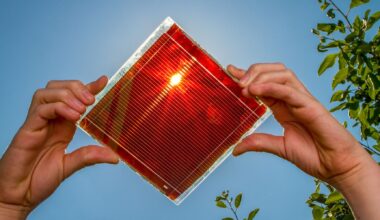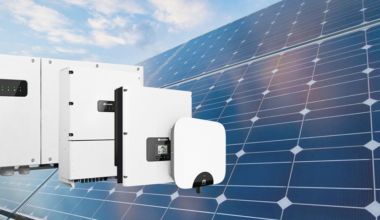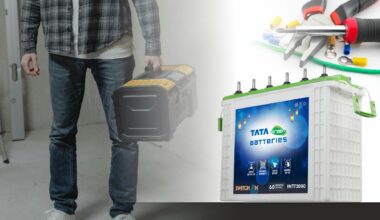1. Introduction
- Overview of solar charge controllers
- Importance of understanding solar charge controllers for solar system users
2. What is a Solar Charge Controller?
- Definition and basic functionality
- Types of solar charge controllers (PWM vs. MPPT)
3. How Does a Solar Charge Controller Work?
- Explanation of the working principle of solar charge controllers
- How it regulates the flow of electricity
4. The Importance of a Solar Charge Controller in Solar Systems
- Preventing overcharging
- Protecting batteries
- Optimizing solar energy use
5. Types of Solar Charge Controllers
- PWM (Pulse Width Modulation)
- MPPT (Maximum Power Point Tracking)
6. Key Features of a Solar Charge Controller
- Voltage regulation
- Battery status monitoring
- Efficiency of power conversion
7. How a Solar Charge Controller Protects Your Solar Battery
- Overcharge protection
- Reverse current protection
- Battery discharge prevention
8. Benefits of Using a Solar Charge Controller
- Increased battery lifespan
- Better system performance
- Maximized energy use
9. Choosing the Right Solar Charge Controller for Your System
- Factors to consider (battery voltage, solar panel size)
- How to match a controller to your solar system needs
10. Top Solar Charge Controller Brands and Models
- Popular models and what makes them stand out
- Reviews and comparisons
11. Installation of a Solar Charge Controller
- Step-by-step installation guide
- Safety precautions during installation
12. Troubleshooting Common Issues with Solar Charge Controllers
- Common problems and their solutions
- Signs of a malfunctioning solar charge controller
13. Solar Charge Controllers and Solar System Efficiency
- How they improve the efficiency of your solar setup
- The role of a charge controller in a hybrid system
14. Future Trends in Solar Charge Controllers
- Advancements in technology
- What to expect from solar charge controllers in the coming years
15. Conclusion
- Summary of key points
- Final thoughts on the importance of a solar charge controller
16. Frequently Asked Questions (FAQs)
- What is the lifespan of a solar charge controller?
- Can I use a solar charge controller with any battery?
- How do I know if my solar charge controller is working properly?
- Can a solar charge controller improve the efficiency of my solar panels?
- What happens if I don’t use a solar charge controller?
Solar Charge Controller 101: What It Is and Why Your Solar System Needs One
Introduction
Are you looking to get the most out of your solar energy system? If so, understanding a solar charge controller is essential. This small but powerful device plays a critical role in protecting and optimizing your solar power setup. Whether you’re off the grid or looking to enhance your residential solar system, learning how a solar charge controller works can help you save money, boost energy efficiency, and extend the life of your solar batteries.
In this article, we’ll break down everything you need to know about solar charge controllers, their functions, types, and how to choose the right one for your system.
What is a Solar Charge Controller?
A solar charge controller is a device that regulates the voltage and current coming from your solar panels to charge your battery. Essentially, it prevents your battery from being overcharged and ensures it doesn’t discharge back into the solar panels during the night or low light conditions. The charge controller ensures your battery stays at the optimal charge level and prevents potential damage from overcharging, which could shorten the battery’s lifespan.
There are two main types of solar charge controllers: PWM (Pulse Width Modulation) and MPPT (Maximum Power Point Tracking). Each type works differently, and choosing the right one depends on your solar system’s size, your battery type, and your efficiency needs.
How Does a Solar Charge Controller Work?
A solar charge controller operates by controlling the flow of electricity between the solar panels, the battery, and the load (devices or appliances powered by the battery). It regulates the charging of the battery by monitoring the voltage and current generated by the solar panels.
- PWM (Pulse Width Modulation) controllers slowly charge the battery by gradually decreasing the charge as the battery reaches full capacity.
- MPPT (Maximum Power Point Tracking) controllers are more efficient and continuously track the optimal charging point for the battery to maximize energy intake. This makes MPPT controllers more suitable for larger systems with higher efficiency needs.
The controller ensures the battery isn’t overcharged and doesn’t discharge back into the solar panel system, protecting both the battery and the system’s overall performance.
The Importance of a Solar Charge Controller in Solar Systems
The solar charge controller is one of the most crucial components in any solar energy system. Why? Because it provides essential protection for both your battery and the entire system. Here’s how:
- Preventing Overcharging: When a battery is overcharged, it can quickly degrade, reducing its capacity and lifespan. A solar charge controller ensures the battery is charged only to its optimal level.
- Protecting Batteries: Batteries are sensitive, and a charge controller ensures that they’re never overcharged or discharged beyond safe limits.
- Optimizing Solar Energy Use: Charge controllers also help ensure that the power generated by the solar panels is used effectively, maximizing the energy efficiency of the system.
Types of Solar Charge Controllers
There are primarily two types of solar charge controllers used in solar systems: PWM and MPPT.
- PWM Controllers: These controllers are less expensive and often used in smaller, less demanding systems. They provide basic regulation and are suitable for users who have smaller solar setups or those just getting started with solar energy.
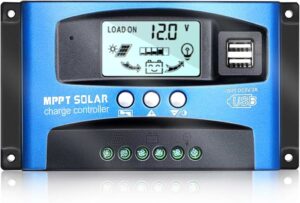
- MPPT Controllers: These are more advanced and efficient, especially for larger systems. MPPT controllers track the maximum power point of the solar panels, ensuring that the system always operates at peak performance. They are ideal for maximizing the output from solar panels and are more effective in varying sunlight conditions.
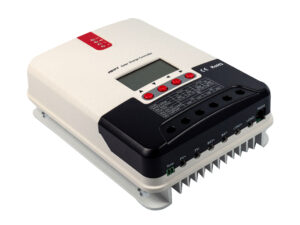
Key Features of a Solar Charge Controller
When selecting a solar charge controller, there are several key features to look for:
- Voltage Regulation: A good charge controller will ensure that the battery is charged at a stable voltage, preventing overcharging.
- Battery Status Monitoring: Some controllers come with digital screens that provide real-time information about your battery’s charge level.
- Efficiency of Power Conversion: MPPT charge controllers are known for their higher conversion efficiency compared to PWM, making them a better option for larger setups.
How a Solar Charge Controller Protects Your Solar Battery
The solar charge controller is your battery’s best friend. It provides multiple layers of protection to keep your solar system running smoothly:
- Overcharge Protection: Overcharging is one of the biggest threats to battery health. A solar charge controller prevents this by automatically regulating the charge rate as the battery approaches full capacity.
- Reverse Current Protection: During the night, when solar panels aren’t producing power, the solar charge controller stops the current from flowing back into the solar panels from the battery.
- Battery Discharge Prevention: A controller ensures that your battery doesn’t get excessively drained, which could damage the battery or lead to shorter life cycles.
Benefits of Using a Solar Charge Controller
The solar charge controller offers several advantages for your solar power system:
- Increased Battery Lifespan: Properly managing charging and discharging cycles helps prolong the life of your battery.
- Better System Performance: With a charge controller regulating the battery, your entire solar system works more efficiently, ensuring you get the most out of your solar panels.
- Maximized Energy Use: By managing energy flow and preventing waste, a solar charge controller helps maximize the amount of usable energy in your system.
Choosing the Right Solar Charge Controller for Your System
To choose the best solar charge controller, consider the following factors:
- Battery Voltage: Make sure the controller is compatible with your battery voltage (12V, 24V, 48V).
- System Size: For smaller setups, a PWM controller may be sufficient. For larger systems, opt for an MPPT controller for better efficiency.
- Efficiency Needs: If you need maximum performance, especially in low-light conditions, an MPPT controller is the way to go.
Top Solar Charge Controller Brands and Models
Here are a few popular solar charge controllers that stand out in the market:
- Victron Energy SmartSolar MPPT: Known for its high efficiency and Bluetooth functionality.
- Renogy Wanderer 30A PWM: A budget-friendly option for small systems.
- Morningstar ProStar MPPT: Ideal for medium-sized systems needing reliable performance.
Each of these brands offers great value depending on the size of your solar system and your specific needs.
Installation of a Solar Charge Controller
Installing a solar charge controller is a relatively simple process if you follow the instructions carefully:
- Turn off your system: Make sure everything is disconnected from the solar panels and battery.
- Wiring: Connect the solar panel leads to the charge controller, and then connect the controller to the battery.
- Testing: Once everything is connected, turn the system on and check the display for the correct battery charging status.
Troubleshooting Common Issues with Solar Charge Controllers
Despite their reliability, issues can arise with solar charge controllers. Here are some common problems:
- No Display or Readings: Check if the controller is connected properly to the solar panel and battery.
- Overcharging: Ensure the controller is correctly sized for your system and properly calibrated.
Solar Charge Controllers and Solar System Efficiency
A solar charge controller directly impacts the efficiency of your system by ensuring that the energy from your solar panels is used optimally. It also plays a crucial role in solar hybrid systems, where it ensures that both the solar energy and grid energy are efficiently combined.
Future Trends in Solar Charge Controllers
As technology advances, expect solar charge controllers to become even smarter and more efficient. With advancements in smart monitoring and data analytics, controllers will offer real-time performance tracking and optimization of solar systems.
Conclusion
In conclusion, a solar charge controller is a vital component of any solar energy system, ensuring that your battery is safely charged, protected, and used efficiently. By understanding how it works and the benefits it provides, you can ensure your solar setup is operating at peak performance, helping you make the most out of the clean energy you harness.
Read Also: Solar Inverters Explained: 10 Guides to Clean Energy Solutions
(FAQs)
1. What is the lifespan of a solar charge controller?
Typically, solar charge controllers last for several years. With proper maintenance, most controllers can last between 5 to 10 years.
2. Can I use a solar charge controller with any battery?
No, you need to ensure that the charge controller is compatible with your battery’s voltage and chemistry.
3. How do I know if my solar charge controller is working properly?
Check for signs such as battery voltage fluctuations or no charge output. A properly working charge controller will maintain steady voltage and ensure optimal battery charging.
4. Can a solar charge controller improve the efficiency of my solar panels?
Yes, by preventing overcharging and ensuring that the right amount of energy is flowing into the battery, a solar charge controller helps improve the overall efficiency of your system.
5. What happens if I don’t use a solar charge controller?
Without a solar charge controller, your battery could overcharge, get damaged, or discharge too much, reducing the lifespan of your system and potentially causing system failure.
